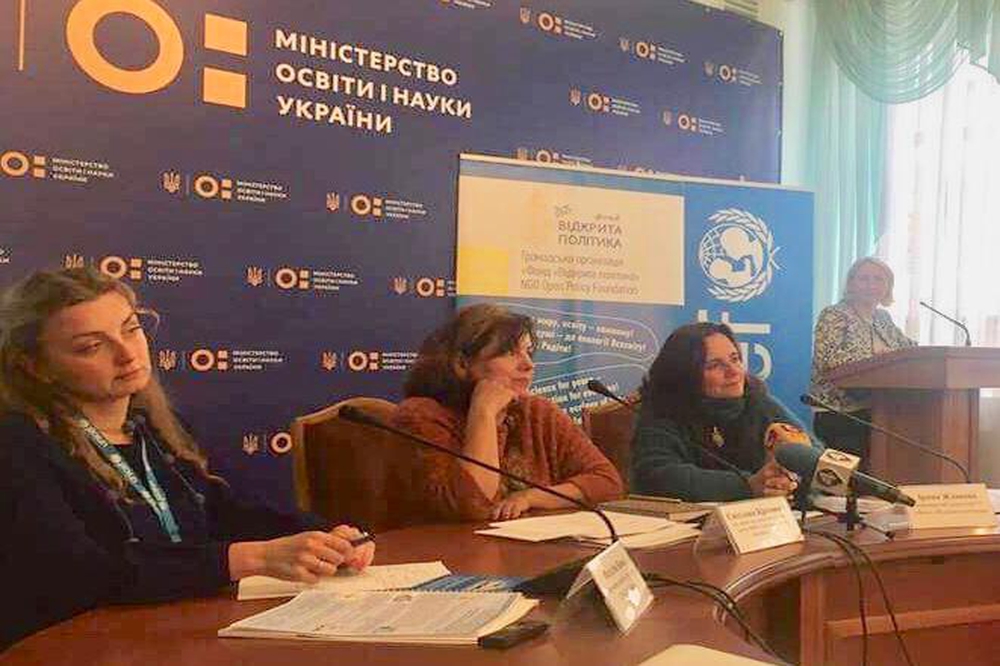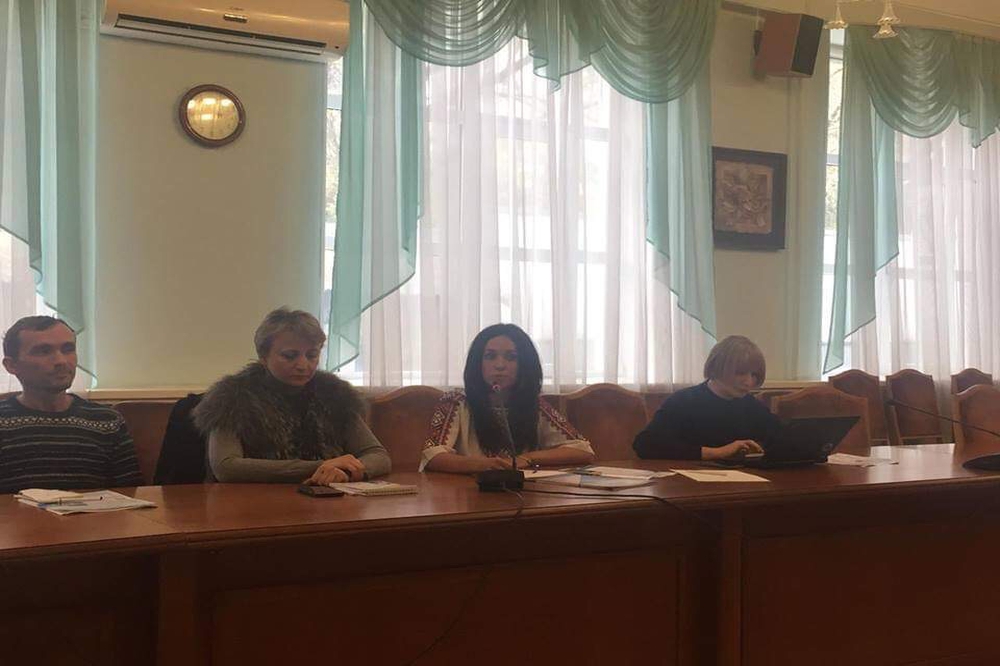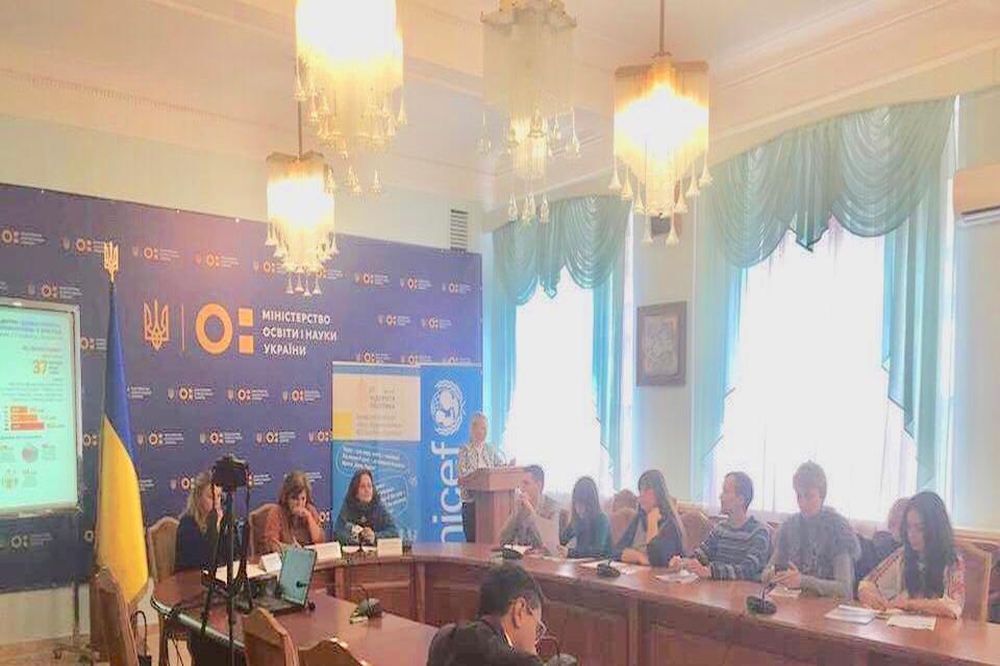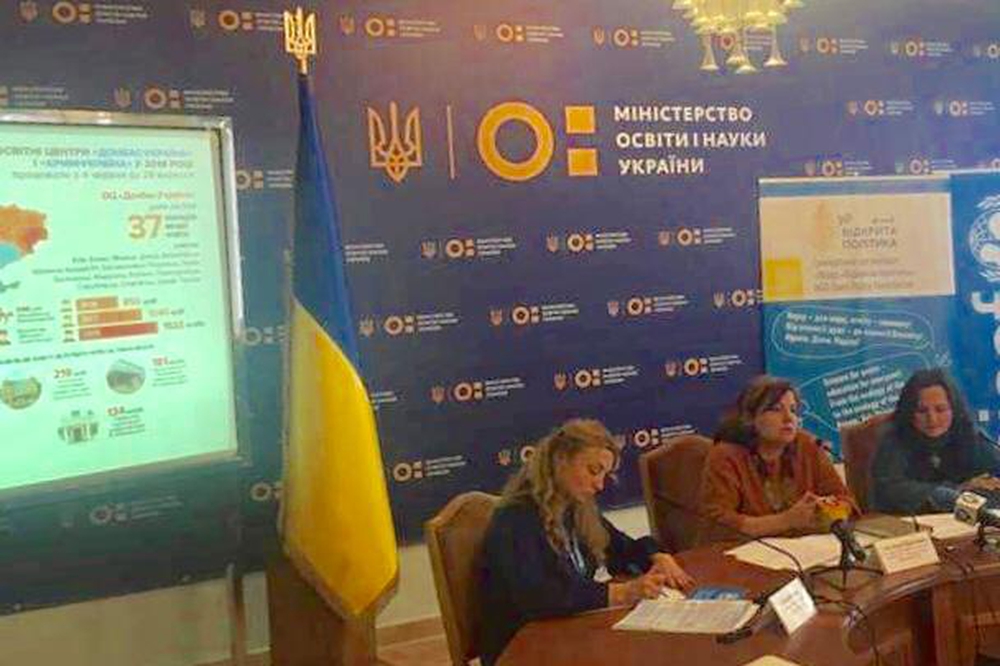News
The Foundation, together with the Ministry of Education and Science of Ukraine, summed up the results of the 2018 admission campaign
Nov. 12, 2018, 7:24 p.m.This year, the “hotline” of the Open Policy Foundation received one and a half times more calls from applicants and their parents from the non-government controlled territories of the East of Ukraine and Crimea than last year. It was reported by executive director of the Open Policy Foundation, Ph.D. in History Iryna Zhdanova during a press conference on the topic “Results of admission of applicants from Crimea and eastern Ukraine to higher education institutions in 2018”, which took place on October 24 at the Ministry of Education and Science (MoES).
Together with MoES and with the support of UNICEF, the “hotline” of the Foundation has been working for the third year in a row on educational questions.
Iryna Zhdanova presented successful stories of young people from non-government controlled areas of Ukraine who turned to the hotline and, despite numerous barriers, entered Ukrainian universities, colleges, vocational schools at state-subsidized places to get a quality education and a better future.
The head of the Foundation voiced the most common questions with which applicants from non-government controlled areas address to the "hotline":
- Distance education
- Simplified admission procedure through Educational Centers (EC)
- Registration in the application user account
- Low scores in the External independent evaluation
- Quotas for Crimeans
- Obtaining a Ukrainian passport in the form of an ID card
- Benefits for children of the ATO participants and internally displaced persons (IDPs)
- Receiving a military service registration certificate (for young men)
- Inability to take advantage of the rural coefficient through registration at NGCA
"For UNICEF, education and access to education are one of our work priorities, - said Nataliya Kyyak, the head of educational programs at UNICEF Ukraine. - And we are talking about children's access to all levels of education. With the onset of an emergency in eastern Ukraine, UNICEF very active joined a number of projects that are being implemented in the east, especially in Donetsk and Luhansk regions. The project of the Open Policy Foundation is one of our projects with which we have been working for the fourth year in a row. This year we supported the hotline and information campaign of the Foundation. We were especially pleased to see that the program had expanded this year. The video we saw on the Intercity train when traveling from Kramatorsk to Kharkov was a very pleasant signal. This means that the organization has reached its high level of ability, and the level of coverage of applicants and their relatives has, of course, grown. UNICEF will continue to work in this direction. Definitely, this topic remains a priority for us. We are interested in promoting access to education not only for graduates but also in a much broader approach to the topic of education.”
The head of the Open Policy Foundation noted that for four years the Foundation, with the support of UNICEF, has been working with the Ministry of Education and Science of Ukraine. “We are expanding cooperation not only with regional but also with district administrations of Donetsk and Luhansk regions, government departments, education departments, educational institutions located along the “contact line”, said Iryna Zhdanova. “Partly the Ministry of Information Policy helped this year, but we would like to see more. We are concerned that cooperation with the Ministry of Temporarily Occupied Territories and IDPs of Ukraine was minimal this year. There were cases when, at the height of the admission campaign, the head of the MinTOT regional sector in Kramatorsk delayed finished information products and did not place them at the entry-exit checkpoints, but we found a way out: we agreed with the State Border Guard Service and, together with the chief of staff, Major General Oleg Tsevelov, met with other border guards and quickly solved the problem: we drove through all entry-exit checkpoints and personally posted information products. Now videos with information about the possibility of entry are broadcast on the monitors at the entry-exit checkpoints.
During the press conference, representatives of the “Donbas-Ukraine” and “Crimea-Ukraine” educational centers, Donetsk National Technical University, V.I. Vernadsky Taurida National University, Volodymyr Dahl East Ukrainian National University, and Kherson National Technical University told about the work during the introductory campaign. In particular, they noted that this year the number of applicants entering through the education centers from non-government controlled territories and Crimea to vocational schools after the end of the ninth grade has increased significantly.
“This year we are planning to start an information campaign immediately after the completion of the 2018 results. In November, the Foundation will hold a series of briefings in Sievierodonetsk and Kramatorsk, where the 2019 new information products will be presented,” summarized the press conference Iryna Zhdanova.
For reference:
The event was organized by the Ministry of Education and Science of Ukraine, the Open Policy Foundation with the support of UNICEF.
Every year, the Open Policy Foundation actively distributes printed information products, namely postcards, posters, road maps, videos about the possibility for children and young people from the east to enter Ukrainian universities and vocational schools. Information products are placed in “Donbas-Ukraine” and “Crimea-Ukraine” educational centers, at all entry-exit checkpoints of Donetsk and Luhansk regions, in Intercity trains and carriages, in employment centers, pension funds, and others.
Videos created by the Open Policy Foundation with the support of UNICEF:
Simplified procedure for entry into vocational schools - 2018
https://www.youtube.com/watch?v=m_1iBOztgrA
The 2018 roadmap for applicants from the east of Ukraine
https://www.youtube.com/watch?v=NHLYKVBA14k
Introductory campaign-2018 for applicants from the east of Ukraine (for broadcast in the carriages of Intercity trains that are heading east)
https://www.youtube.com/watch?v=mX5Q4mc1u00
Video instruction for applicants from the east of Ukraine - 2018 (with the support of the Embassy of the Lithuanian Republic in Ukraine)
https://www.youtube.com/watch?v=Wu7Vheay37w
“Hotline” of the Open Policy Foundation in Kyiv
0800504425 - FREE!
Mobile phones: +38 068-951-25-13; +38 050-550-54-11 (Viber / Telegram / WhatsApp / Skype: Dostupna Osvita).
Kramatorsk
0800 50 45 22 - FREE!
+38 066 113 93 75
+38 097 904 71 91
Skype: Dostupna Osvita Kramatorsk
Sievierodonetsk
0800 50 45 11 - FREE!
+38 099 345 20 76
+38 097 983 65 31
Skype: Dostupna Osvita Sievierodonetsk
Kherson
0800 50 45 70 - FREE!
+38 097 983 65 91
+38 095 875 74 99
Skype: Crimea Dostupna Osvita
Consulting telephone lines are open on weekdays from 9:00 to 13:00, from 14:00 to 18:00.
More information: dostupnaosvita.com.ua




